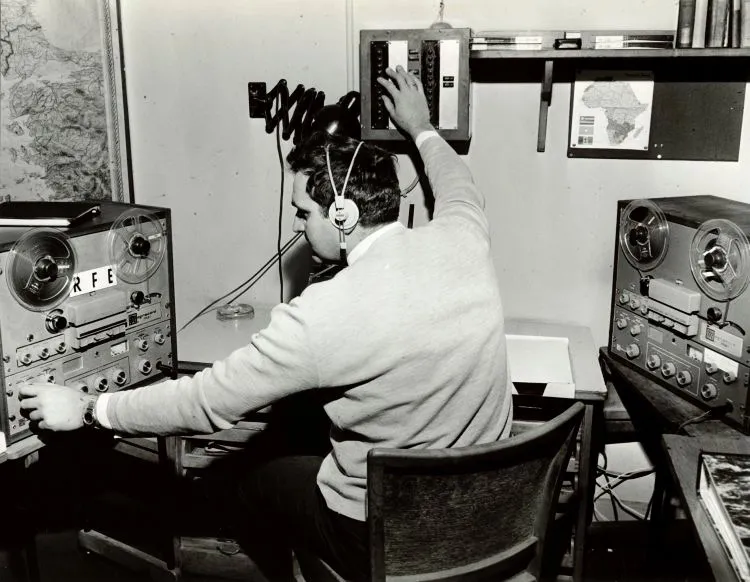Table of Contents
On Sunday, February 9th, while responding to U.S. Special Presidential Envoy for Special Missions Richard Grenell on X, Elon Musk called for shutting down US-funded media outlets Voice of America and Radio Free Europe/Radio Liberty (RFE/RL), stating:
"Yes, shut them down. Europe is free now (not counting stifling bureaucracy). Nobody listens to them anymore. It’s just radical left crazy people talking to themselves while torching $1B/year of US taxpayer money."
At first sight, the closure of taxpayer-funded media outlets may seem like a natural part of the Department of Government Efficiency’s (DOGE) plan to reduce public spending: why should the United States fund media outlets on a different continent? However, looking back at the history of how and why those media outlets came to be in the first place underlies their importance in the modern day.
I come from Romania, one of the countries where RFE/RL has been broadcasting since its inception. When my country was a communist dictatorship, RFE/RL was the only place most citizens could get access to real, uncensored, and democratic news. Tuning into the radio broadcasts that RFE/RL put out often came with a great price: Rumors that you had been seen listening to RFE/RL was enough reason to get you in trouble with the secret police, have you demoted at work, or even sent to jail.
In the case of the Romanian broadcasts, RFE/RL journalists, most often educated Romanians who had received asylum in Western European countries, were often still subjected to persecution for speaking up against the brutal effects of communism. Communist governments were aware that free access to uncensored information would ruin the authoritarian mirage they had painstakingly developed, leading to regimes trying to block open media through intimidation, threats, and physical attacks.
This discussion on RFE/RL’s future could not be more timely. One of the most violent acts that the communist Eastern European regimes organized to stop RFE/RL, the February 21st bombing of its Munich headquarters, is approaching its 44th anniversary. At the orders of Romanian dictator Nicolae Ceausescu and with the acknowledgment of other secret services, a bomb was set in the Czechoslovak broadcasting section (although the intended target was the Romanian broadcast), injuring 4 employees.
This is far from the only violence RFE has faced in its history. Monica Lovinescu, a cultural broadcaster for RFE, was physically attacked by two Palestinian agents sent by Romanian secret police at the orders of Ceausescu in 1977 at her home in Paris. A year later, in 1978, Bulgarian RFE journalist Georgi Markov was assassinated, stabbed in the leg with an umbrella containing the lethal poison ricin, with the main suspect being a Bulgarian secret service agent.
The bravery of the journalists and staff who risked their lives in the pursuit of truth, speaking out against authoritarian, barbaric regimes across all of Eastern Europe should serve as an inspiration for all, especially in the United States. In the context of apathy in American media or academia to extreme left-leaning ideologies, the testimonies of individuals who have experienced the terrors of communism first-hand must not only be preserved, but cherished, especially by an administration that claims to have anticommunism as one of its core principles.
RFE/RL remains just as relevant today as it was in the 1980s; its continued existence is not only fundamental to upholding the memory of the anticommunist press in Eastern Europe, but also serves to safeguard that freedom against emerging threats to democratic, Western countries. As countries such as China and Russia ramp up their propaganda efforts, it remains crucial that America maintains its foothold in Eastern Europe through RFE/RL.
If there is truly a concern in regards to US state-funded media outlets spreading radical-left propaganda, completely closing them would be a counterintuitive solution. A change in the policies and administration of those media outlets would be much more appropriate, ensuring that the US actively promotes the pursuit of truth through journalism, but also pro-American and Western values such as individual liberty.
The call to shut down Voice of America and Radio Free Europe/Radio Liberty ignores the vital role these institutions have played—and continue to play—in the fight for truth and democracy. These media outlets have been lifelines for those trapped under authoritarian regimes, providing uncensored information at great risk to both journalists and listeners.
While concerns about bias in taxpayer-funded media should not be dismissed, dismantling these institutions altogether would be a short-sighted response. Instead, ensuring their commitment to truthful, independent reporting and reinforcing their dedication to democratic values would be a more constructive approach. In an era where authoritarian regimes are waging information warfare, the United States should not abandon one of its most powerful tools in the battle for global freedom.





